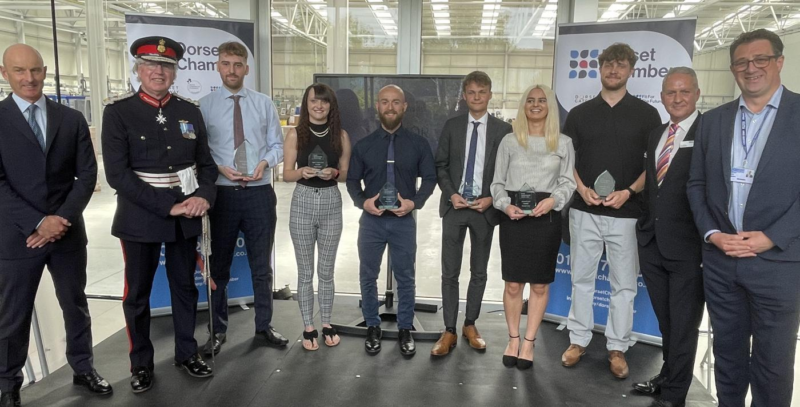Bournemouth and Poole College Excels at IMechE Design Challenge 2025
Fifty-five students attended the IMechE Design Challenge Wessex Regional Final at the impressive joint MOD and Dorset County Council Battlelab facility in Dorset for the 2025 competition. Bournemouth and Poole College came out with a great set of wins, and as a result, they are heading towards the national competition.
The IMechE Design Challenge is an annual challenge for students to undertake a design and build project to reflect industry, with specifications set out by the Institution of Mechanical Engineers (IMechE), working collaboratively with partners to facilitate the final projects. The purpose of this year’s challenge was to produce an autonomous vehicle that mirrors the Port-to-Terminal charging points at coastal ports such as Malaysia, whereby an Electric Vehicle (EV) can recharge by stopping without the driver getting out to recharge the car - in a short space of time.
Opening the event, Phil Ireland from the IMechE, set the landscape for the students, explaining that they would be given a tour of the Hangar facility adjacent to the venue, where they could see how Battlelab engineers and staff tested in a movie-set environment and could control the complete environment surrounding the product, to iron out confounding variables for future autonomous military vehicles.
As part of the competition, students were required to design a 3D model, create a presentation, a poster, a peer review and on the day demonstrate device capability. The end result was a physical model which, despite the design brief, looked very different for each of the teams competing for the esteemed IMechE prizes. Students from the University of Southampton, Bournemouth University and Bournemouth and Poole College all participated, and in total, ten teams of student Engineers took part.
Mid-morning, students presented in groups their designs and demonstrated how they met all stages in the brief. This included concepts and challenges they experienced in the creation of their models. They showed the audience and insight into how they came up with their designs.in terms of sustainability, materials and their schematic designs and mathematical equations plus system testing. This included explaining how they improved the product in their design.
Each team gave a five-minute overview of their design and answered questions, from the panel of judges, on their experience and processes they used. Their initial brief gave them a budget of £90 for the Advanced Class and £50 for the Foundation and Concept Classes. There was great variation in the final price ranging from £27 to almost the full budget, dependent on which level of Engineering they were studying – Concept level, Foundation level or Advanced level. Students were in teams of 3, 4, 5 and 6 accordingly – with a range of experience in their pathways – from Medical Engineering to Aerospace and Acoustic Engineering to Mechanical.
Over lunch, the students had to make an immobile ‘open architectural robotics platform’ (robot) re-mobile. Then evidence how they successfully achieved the task by making it weave in and out of the tables and do rotational turns. Students also took turns on a Segway to relax and have a bit of relaxation time.
Will, a second year Mechanical Design student from Bournemouth and Poole College, attending the challenge, said: “It’s been really exciting to be part of the regional competition with such an excellent group of engineers and support from the college. It’s thrilling to actively be a part of the feature in Mechanical Engineering and Design.”
The afternoon session featured the practical testing of the models, where each team had to complete runs at three different distances—short, medium, and long. These distances were set during lunch to prevent any presets, ensuring that each model relied purely on its design and engineering capabilities for performance. For the Foundation teams, the challenge involved traveling to a recharging target on a vertical wall before accurately returning to their starting position. At the Advanced level, the complexity increased as models had to travel to a second recharging target before accurately returning to a new position set by the judges, requiring greater use of sensors and advanced engineering solutions. With only two minutes between runs for adjustments and modifications, teams had to be highly organised, think on their feet, and perform well under pressure. Their ability to adapt and optimise their designs in real time was truly impressive.
Bournemouth and Poole College Engineering students attended from all three levels, they all participated coming back with a fantastic set of results which will take them forward for the national competition.
- Concept level: 1st and 2nd place
- Foundation level: 1st and 3rd place
- Advanced level: 2nd and 3rd place
Matthew White, HE Engineering Framework Leader organising the event, said: “It was truly a privilege to witness so many enthusiastic engineering students at the start of their careers. The dedication and effort put into their designs and builds were evident, and I hope everyone enjoyed the day as much as I did. I am confident that valuable lessons were learned, which will be carried forward into their future careers. The competition between the university teams was friendly yet highly competitive, with each team striving to win their category. Well done everybody.”
Harry, a first-year student from Southampton University, whilst getting his model ready for the challenge, said: “It’s a bit stressful, there were some bad connections not working during the test phase before the competition itself, which we tried hard to fix. The food was good, and listening to the presentations was really interesting. The venue feels very suited to the Engineering tech environment this year.”

Latest News
 23rd May 2022
23rd May 2022
College Apprentices excel at Dorset Apprenticeship Awards
 16th June 2022
16th June 2022
Bournemouth & Poole College lecturer awarded with certificate of excellence at Pearson National Teaching Awards
 29th June 2022
29th June 2022








